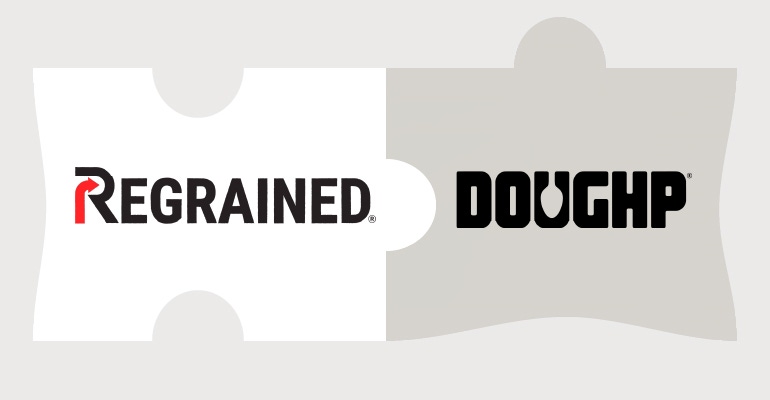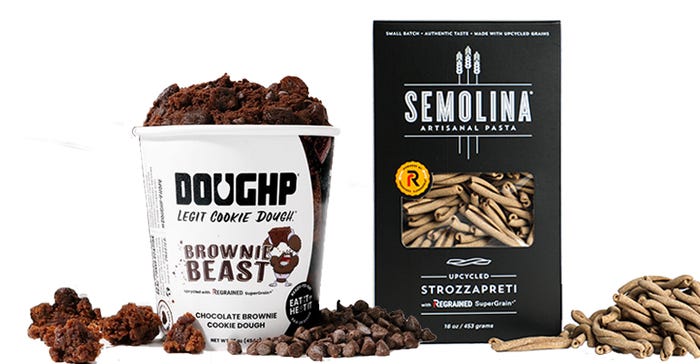To increase the sustainability of their products, Doughp and Semolina Artisanal Pasta replace a portion of flour with ReGrained’s SuperGrain+, an ingredient upcycled from spent beer grain.

Modern day competition has come a long way from its early Latin root, competere, which means to strive for something simultaneously with the same goal. Fortunately, some brands are taking that original meaning to heart and recognizing the value of using each other’s resources to lift one another towards a shared objective.
This is particularly true in the natural products industry where competition also means collaboration, as well as a motivator to find partnerships well suited to a brand’s mission and goals. New Hope spoke with three brands, Just Egg, ReGrained and Renewal Mill, to learn more about the impact of their recently co-created products with other brands. Find the story about JUST Egg here and Renewal Mill here. These brands are showing exciting innovation when they lean on each other’s specialties and resources to create new products. In the first of this three-part series, discover why ReGrained chooses to partner with others and examples of products that fulfill the spirit of competere.
An Eco-friendly Collaboration
ReGrained focuses on upcycling the leftover nutritious grain from brewing beer. ReGrained has partnered with other brands—Doughp and Semolina Artisanal Pasta, to name two—to include its SuperGrain+ as an ingredient. In addition to being an upcycled ingredient supplier for these partnerships, ReGrained also manufactures its own product lines, such as snacks and baking mixes, to help show other companies and consumers what is possible with upcycling.
We spoke with Daniel Kurzrock, co-founder and CEO of ReGrained, about the importance and benefits of using upcycled ingredients when creating new products. Some answers have been edited for clarity.
Why is it important for ReGrained to have its SuperGrain+ incorporated into other food products?
Daniel Kurzrock: We recognized that the opportunity to make the most impact would be through developing ingredients solutions. If we could create something that would be of value to food companies, it would create a win-win across the board. It creates a higher value for our suppliers and starting brewers, and then it kind of connects the dots in a new way. In our case, we want to provide that aspect of communicable value specific to sustainability.
How is ReGrained helping brands create new products and promote upcycling as an important possibility?
DK: It's been interesting how that's changed over the years. Now people are coming to the table a lot more informed about what upcycled foods are. Some years ago, when we were first starting to talk about this, we were educating folks about everything. So we get folks coming to us, we go to them, and there's always this important aspect of the relationship where we say upfront, “Hey, we're not a typical commodity ingredient supplier. We are an innovation partner.” We have proprietary ingredients, but we're coming to the table as a collaborator. We are increasingly finding that there is an appetite for open innovation, which sometimes manifests as co-branding—the best-case scenario for an ingredient supplier. If people just want to find a bulk ingredient filler product, they can go elsewhere, we're here to create better things together.

How have you found the collaboration process?
DK: Well, you have to approach each of these engagements with an open mind as to how they feel about things to really play to your strengths. That's where the best collaborations are going to come from. In some relationships, we are very involved with R+D and developing prototypes. And others have really good R+D, and maybe they need some help thinking through the positioning of the products, like branded packaging design, which we're always reviewing and suggesting. Ultimately, we are a partner to the finished product maker. We recognize that we don't have equal decision-making necessarily over what size a logo is or exactly where it is. But we try to bring together an expert perspective on the market and on using our ingredients effectively. Honestly, it is very energizing the relationships because we're generating something new together.
How has collaborating affected ReGrained and its partners?
DK: It should be a win, win, right? Going in both directions. There's always going to be someone who's maybe slightly bigger or maybe a lot bigger, but that doesn't mean there's no more authenticity and value that can be created by partnering with someone who does something you don't already do. It creates more dimensions and textures to the stories that companies want to be telling their customers. We are trying to elevate the ecosystem.
What advice would you give to other CPG brands interested in starting collaborations?
DK: Have fun with it. It should be fun, and they're not all going to work. The key here is to be creative together and go forth together. As you pointed out earlier about collaboration versus competition, maybe this is what competition is supposed to be like, creating better things together. And again, it should be fun. It should be done with an attitude that this could be great or might not work, but the journey is also something I think both companies will take a lot away from.
About the Author(s)
You May Also Like




